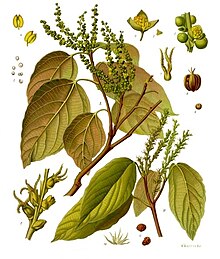| Mallotus philippensis | |
|---|---|

| |
| Scientific classification | |
| Kingdom: | Plantae |
| Clade: | Tracheophytes |
| Clade: | Angiosperms |
| Clade: | Eudicots |
| Clade: | Rosids |
| Order: | Malpighiales |
| Family: | Euphorbiaceae |
| Genus: | Mallotus |
| Species: | M. philippensis
|
| Binomial name | |
| Mallotus philippensis | |
| Synonyms | |
Mallotus philippensis is a plant in the spurge family. It is known as the kamala tree or red kamala or kumkum tree, due to the fruit covering, which produces a red dye. However, it must be distinguished from kamala meaning "lotus" in many Indian languages, an unrelated plant, flower, and sometimes metonymic spiritual or artistic concept. Mallotus philippensis has many other local names. This kamala often appears in rainforest margins. Or in disturbed areas free from fire, in moderate to high rainfall areas.
It occurs in South Asia, Southeast Asia, as well as Afghanistan and Australia. The southernmost limit of natural distribution is Mount Keira, south of Sydney. The species name refers to the type specimen being collected in the Philippines, where it is known as banato.